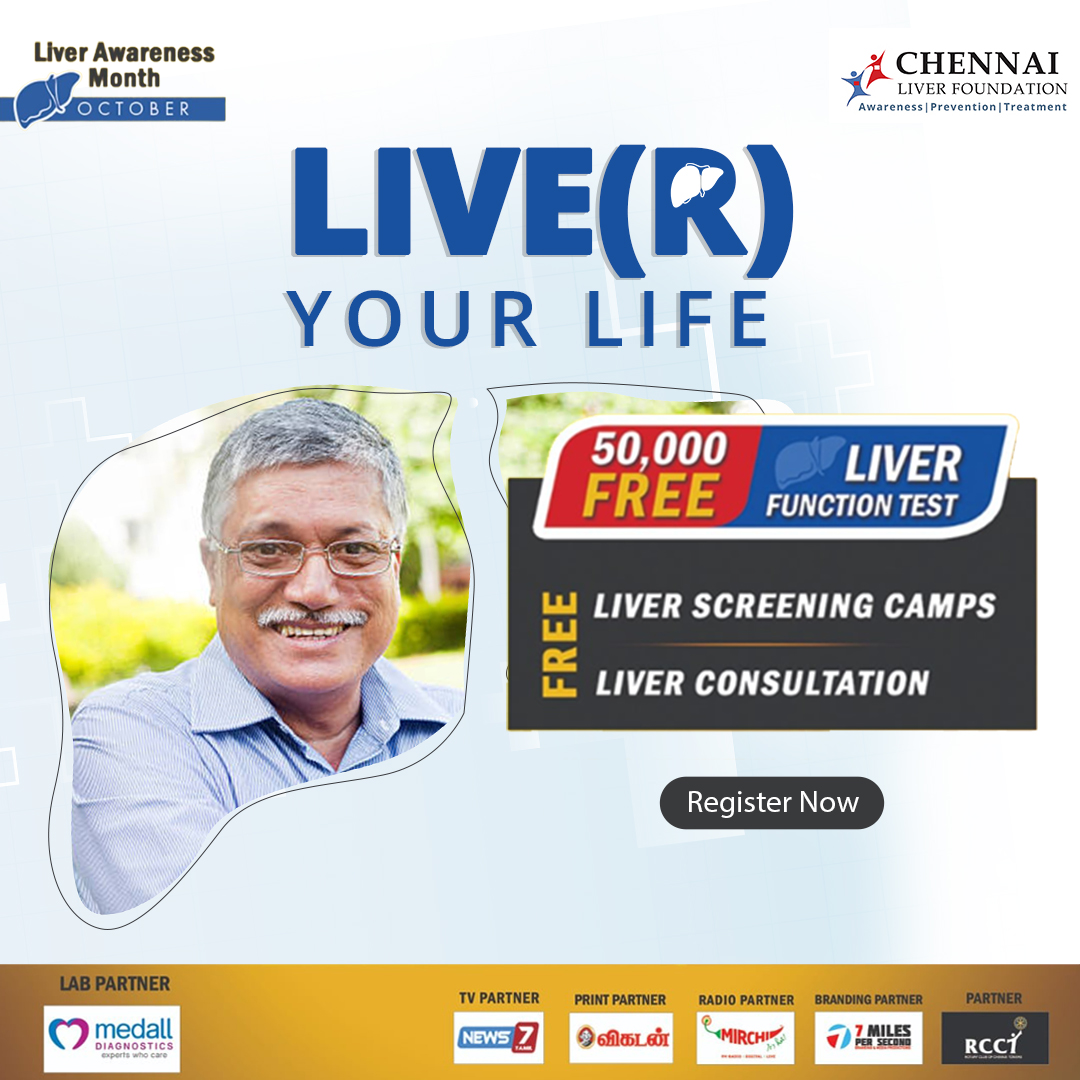Liver your Life – Liver Awareness Month Oct 2021
Liver disease is a silent killer and kills more people than Malaria and AIDS combined each year. Chennai Liver Foundation has been very active in spreading awareness about this for over 40 years now and has conducted many awareness and screening camps across the state.
Despite the good efforts, public awareness about liver health has not been taken seriously. This October, Chennai Liver Foundation along with our partners has decided to up the efforts by increasing the visibility and organizing more screening camps. CLF along with partner MedAll will be providing FREE Liver Function Test and FREE Liver Consultation this month to more people to diagnose any underlying liver conditions.
To get a FREE Liver Function Test, signup in the form above. Contact the best liver transplant surgeon in Chennai, Dr. Vivekanandan, for a FREE liver consultation Please share your contact information with us.

Why Liver Awareness?
Your liver is the most important organ in your body and does hundreds of essential jobs. Apart from filtering the blood coming from the digestive tract, the liver also detoxifies chemicals and metabolizes drugs. The liver also makes proteins that are important for blood clotting and other functions.
The liver works very hard and can take a lot of abuse, but like an elastic band – it gets damaged when it reaches the peak of its elasticity. Remember, you have only one Liver. It’s important to know how to look after it. With an early diagnosis of an underlying liver condition, the liver can repair itself with proper Liver treatment, reversing the damage. Reversal is less likely in the advanced stages.
National Liver Awareness Month in October encourages you to act early and be safe in preventing liver disease. Chennai Liver Foundation has events planned all through October month to keep you informed about that heavy lifter in your body, the liver.
Live(r) Your Life – Daily Actions Library
Day 1: Join the Liver(r) Your Life Campaign
Day 2: Locate Your Liver
Day 3: Learn the Liver’s Function
Day 4: Discover the Liver’s Superpower
Day 5: Learn About Liver Cirrhosis Treatement
Day 6: Learn about Liver Diseases
Day 7: Learn Liver Disease-Related Symptoms
Day 8: Understand HCC
Day 9: Learn How HCC May Be Diagnosed
Depending on the results, your doctor may order a biopsy of your liver.
Day 10: Learn About Liver Transplant Surgery
Day 11: Discover the 2 Types of Liver Transplants
Day 12: Identify the 2 Types of Fatty Liver Disease
Day 13: Understand Alcohol’s Effect on Cirrhosis
Day 14: Discover Healthy Ways to Love Your Liver
Day 15: Learn Why Maintaining a Healthy Weight Is So Important
Day 16: Learn the risk factors for Hepatitis B
Having unprotected sex with multiple sex partners or with someone who’s infected with HBV.
Sharing needles during IV drug use.
Working in a job that exposes you to bodily fluids including blood.
Being born to an infected mother.
Day 17: Learn the risk factors for Hepatitis C
Sharing drug paraphernalia.
Being stuck by a used blood needle.
Working in a job that exposes you to blood.
Receiving blood transfusions prior to 1992.
Being incarcerated.
Being in combat in the military
Day 18: Learn About Liver Related Genetic Disorders
Day 19: Learn About Comorbidities
Day 20: Learn About Liver Function Tests
Day 21: Get the Hepatitis B Vaccine
Day 22: Get the Hepatitis C Screening
Day 23: Drink Coffee!
Day 24: Stop Drinking Alcohol
Day 25: Lose 10% of Your Body Weight
Day 26: Register to Become a Liver Transplant Donor
Day 27: Review Action Steps
Drink coffee.
Stop drinking alcohol.
Lose 10% of your body weight.
Become a liver donor.
Day 28: Take Action
Get a free Liver Function Test.
Get a free liver consultation through Chennai Liver Foundation.
Get a Hepatitis B vaccination.
Get a one-time Hepatitis C screening.
Day 29: Share the Word
Follow up on Facebook.
Subscribe to our Youtube Channel.
Let them know about our camps.
